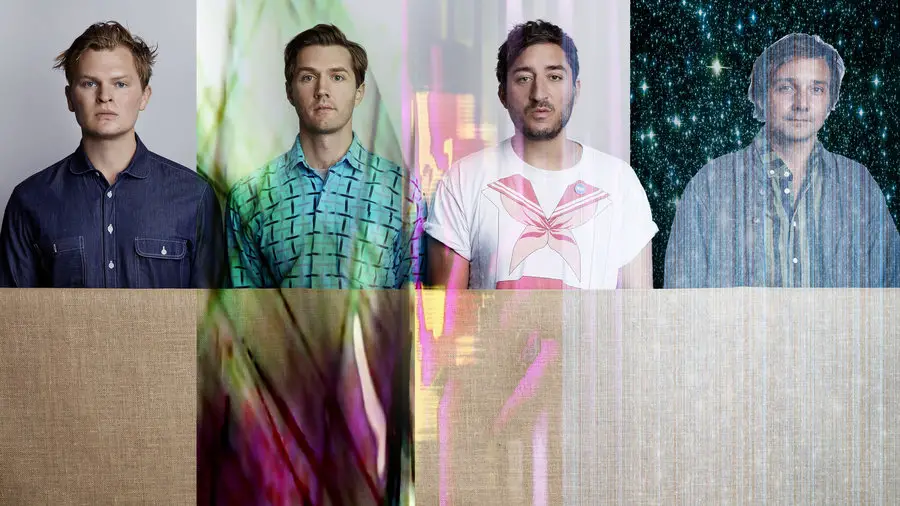A Casual Ramble about Summer, the California Sound, and how it has nothing to do with French Cassettes’ stellar second record, ‘Rolodex’.
•• •• •• ••
Stream: ‘Rolodex’ – French Cassettes
I do get a kick out of hearing words. It could be a word that I already know but people say it in a very funny way or in very funny context. That sometimes sparks some weird sounds like, ‘Oh, that actually is kind of a neat word to use in a song.’
– Scott Huerta, French Cassettes
There is no feeling like the first day of summer.
Here in Oregon, it felt like it would never come. Oh sure, the weather improved week-to-week. But the rain haunted every Saturday and plagued every Sunday. Ever vital, yet still so depressive, Oregonians had to hang weekend plans on the doornail as they waited for some sunny day to call their own.
In truth, I have been raring for this season for much longer than two months. Four months to be sure. Since that day of false Spring before setting off to Boise for Treefort 10.
And despite the recent heat dome, I’ve found myself listening to more surf rock and new school sixties R&B. You know the kind, Allah-Lahs, Habibi, levitation room, La Luz, Shannon & the Clams, Mystic Braves. I like to call them the New Sha-la-la-lah’ because I’m quite sure they could bust out that line in any song and it would not sound that out of place.
And one of the bands that I have come to add to this flimsy hypothetical is French Cassettes.
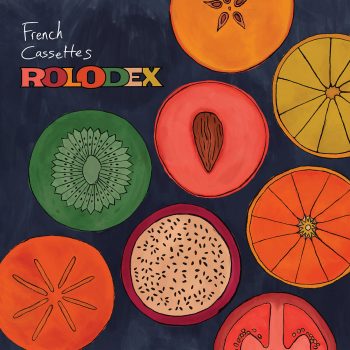
Now to be sure, this didn’t come to me immediately. In fact, after the first play of Rolodex, I wasn’t sure what to make of it. Not because it was bad. But because it was fast, and the task of driving from Portland to Boise precluded a truly deep listen.
However, it also meant plenty of time to let the album wash over me in waves as the sun dipped ever further in my rearview mirror and glistened on the Columbia River. At first, distracted play, one would assume French Cassettes transplanted from Brooklyn straight to Malibu. But they are, in fact, natives of San Francisco Bay.
“We came to San Francisco when we were about 18-19,” says lead vocalist Scott Huerta. He and guitarist MacKenzie Bunch formed the proto-core of French Cassettes in high school, with his brother Thomas on bass. Drummer Rob Mills soon joined later.
“Eventually we met Rob at a show because he was in a band that we liked, and we were just like ‘Wow, this dude’s incredible.’ And it eventually just made sense for him to start drumming for us.”
From there, French Cassettes were formed and began playing something wholly unlike the traditional sound of San Francisco rock on Rolodex, where fog and redwoods reflected something more rustic and bluesy. Nor do they necessarily fit within the confines of the current underground cultivars of psych/punk/prog, duly curated by John Dwyer’s Castle Face label.
I kind of went frantic on ‘Rolodex’ and writing all those parts. I was listening to a bunch of ELO and I was like, ‘Well, he has 50 tracks on here. Why can’t I do that?’
– Scott Huerta, French Cassettes
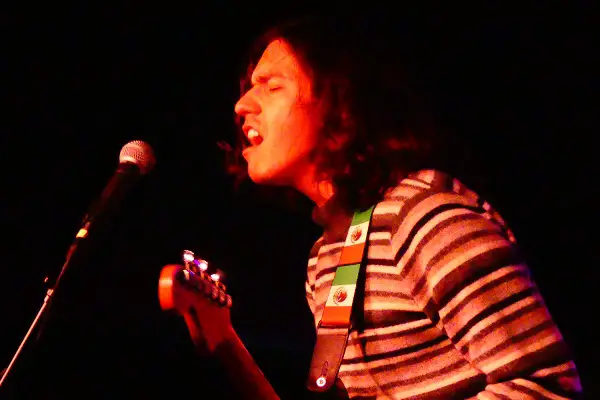
It doesn’t even that crazy similar to modern surf rock’s stripped-down psychedelic, garage or R&B sensibilities. No this sounded more similar to classic American positivism or c’est la vie philosophy. Shit they harmonize like they’re the Beach Boys
And where I hold much affection for anything that arrives by way of the Golden Gate, I have a slight (okay, not really slight) contempt for almost anything touched by the city of Angels. It’s a hurdle they all must jump. No better example of this split is my differing attitude toward the Grateful Dead and the Beach Boys.
I unabashedly love the former. I am selective on the latter.
In popular music, the Beach Boys reflect something innocent about the original appeal of California; good weather, good vibrations, good times. Even in choppy waters, how could one refuse the hope inherent in their melodies and the buoyancy of their harmonies?
Easy: I find the Beach Boys’ early oeuvre insanely manicured and vapid. Tailor-made to advertise a state of mind that is, at best, fleeting. People often forget that Los Angeles was built on a coastal desert. Los Angelenos just propagated some palm trees, paved over a parking lot and called it paradise.
But let’s hang this disdain on a doornail for now to compare and contrast.
There’s just way more music and way more art being made in LA. They’re making choices of the classic conundrum: of writing pop music to please the masses to have a big career. They are prone to make more choices like that because they’re doing stuff to make a career out of music.
– Rob Mills, French Cassettes
Hollywood is still America’s greatest entertainment factory, cradling an ideal nexus to identify and cultivate talent. Seventy years on, the market is still fresh for ideas and people still want to make a career in that. Mills, who moved to the city recently, makes the distinction clear: “There’s just way more music and way more art being made in LA. But they also want to have it as a career.”
In contrast, Mills relates that a great deal of San Francisco-based artists “don’t care about if they get seen by some record label… they just want to do the music because they want to and it’s really pure that way.”
Andy St. James, who filled in on bass for the band, provided a more sobering account: “San Francisco is a difficult place to live as an artist. For those of us who’ve stayed there, the community gets smaller and smaller.”
“But through that, some of the interconnected bonds of creating new art become stronger through those connections. I wouldn’t be playing with these guys if I wasn’t living in Frisco.”
Huerta and Bunch are silent on this part of the conversation, choosing not to offer differing opinions.
They don’t need to; Huerta’s songwriting instincts stand on their own two feet and Bunch’s production gives them life. Making good music doesn’t even come down to geography for them. There was no “I Get Around” or “Good Vibrations” blasting in the engineer’s room, either.
“I was listening to a bunch of ELO,” Huerta recalls, “and I was like, ‘well, he has 50 tracks on here. Why can’t I do that?’”
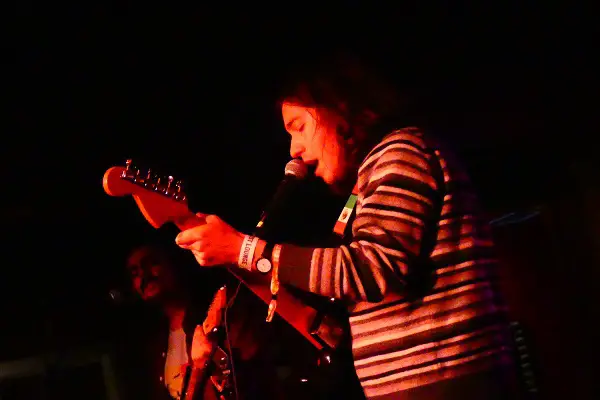
What’s special about San Francisco is a lot of people don’t care about if they get seen by some record label, because there aren’t any record labels over there. It’s like there’s not a lot of music industry, they just want to do the music because they want to and it’s really pure that way.
– Rob Mills, French Cassettes
Assimilating lessons from Jeff Lynne into as minimal tracking as possible, Rolodex (released December 11, 2020) still results in a born-again pop-rock soupçon for melodic harmony cradled in a miasma of Dirty Projector-touched lo-fi garage rock. And all of it is published in a supreme artisan package from Tender Loving Empire, the stalwart Portland art/lit/music boutique.
A core four collection of cuts—split over sides 1 and 2— starts with the bubbly, bouncy bass and lead guitar lines of “City Kitty.” When the suspended backup harmonies and Huerta’s delicious delivery of “Wouldn’t you wanna see the sun?/ Only one, and I’ll feel much younger under the sun.” It was at that moment when the sun slipped down the horizon in my rearview mirror and I realized “fuck, I might actually really like this thing.”
From this vantage point, the record just tumbled into place; “Santa Cruz Tomorrow” came next and became an instant favourite, its gorgeous, winding guitar melodies blessed with a multitude of tones and kissed by the easy breeze of “oohs” in falsetto.
The opening lines slice in tandem: “Got tired of colds/Set my project on the doornail while they both work on in soul” sets the story, while “Undo your tongue/ Are you as sad as you young?” assumes the mood.
As the chorus peels off before Bunch’s guitar line, it suggests they are carving out more space for him to play in, but no. Bunch keeps it taut, and the band jumps right back in with some pow-pow “ooh-oohs.” This repartee becomes a contrasting melodic tease as the band gives a little more space with each traded passage before peeling off again into a singular stanza.
With naught but a clap-clap metronome, they swing from “Sunsets wait to war” into a small bass scale and then bedlam. Clean and dirty guitar tones duck and weave under each other. A gangling melody sprinkles in one ear, a color melody counterbalances on the other. The main melody stalls on two notes and the chorus intends to land softly.
Not so. Huerta hollers a haymaker: “Why do keep waking up to me?/ Yeah, why do you need to make it up to me?/ Yeah, why do you keep waking up to me?“
Two things; firstly, this all happens in a span of fewer than three minutes on the record. The description might feel like four or five, but no. Two minutes, 49 seconds.
Secondly, I have three interpretations as to who this final verse addresses. His partner, his craft or his self each make a compelling case and vacillate in preference with each listen. And while not subscribing entirely to an Anthony Kiedis school of lyric writing, Huerta does cut-up lyrics in a juggle of truisms, rhetorical questions and images of sunsets and lovers all fixed in harmony.
Sometimes it’s such a fragmented narrative of vignettes that trying to decipher an ultimate meaning is to search for the center of a tesseract or the apple within your eye. You’ll just twist yourself out of enjoying the music.
Rather, Huerta finds pleasure “when the melody line fits the shape that the word looks like in your head. I like it when they both kind of (click!) together.”
“When the contour of the melody meets context,” drummer Rob Mills eloquates.
“Thanks, Rob,” Huerta says as his band-mates all either smile or chew on chuckles.
(Side note for the curious: the word eloquate exists as a colloquial verb-form hybrid of eloquent and articulate with a commonly accepted definition that means “to express in a condensed, poignant manner” and damn is it fun to say.)
Mills’ observation is best seen in the following cut, “Utah.”
Huerta sounds undecided on a set of notes, unsure where to go from the precipice of choice. Mills solves his predicament in a single hi-hat clap and the song then launches into a chorus that otherwise feels disconnected from its verse.
“Some go to Utah
Some said they know ya
Some get a new God
Some got to Utah.”
The power of Huerta’s voice compounds as a reference in my meme-diseased mind. he hangs on that last soft palate “ahh,” all I can do is set down my metaphorical newspaper and matter-of-factly admit “I should move to Utah.”
But then I remember I smoke way too much weed for Utahans. Yet there I was, a cat on the precipice of a choice, hanging on a doornail before Mills snapped me back to the moment with another hi-hat. This band harnesses its power when Huerta and co. harmonize, overpowering anything that might resemble a gap in the songwriting.
“Having stepped into these songs last week,” St. James starts, “Scott’s arrangements are super intuitive. It just kind of feels right, you know, to step up to the mic and start singing in harmony because it’s in the writing.”

The final cut of this core four, “Sunday Soda,” is your smooth rock high-point, the kind of song to swing your partner to in delirious living room joy. But it’s not necessarily the parts that I’m thinking about now.
No, now all I can ask myself is how French Cassettes keep this relatively unblemished sonic so fresh, despite riffing off a tight-knit set of ingredients? Whether a minimalist’s approach to Jeff Lynne, a California Sound reborn or a lo-fi aesthetic, they pull it off no less than six times in consecutive fashion.
I think it comes back to the runtime. Not a single song extends past three-minutes-40. And the 26-minute package only just grows overripe with the finishing cut, “So Good.” Like an early Beatles or Beach Boys record that riffs off a single form to mega-success, French Cassettes makes sure Rolodex stays fresh by keeping the tracklist short and the music tight.
Anything else would have just hung too long on that doornail.
— —
— — — —
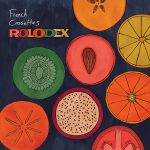
Connect to French Cassettes on
Facebook, Twitter, Instagram
Discover new music on Atwood Magazine
? © 2022
:: Stream French Cassettes ::






